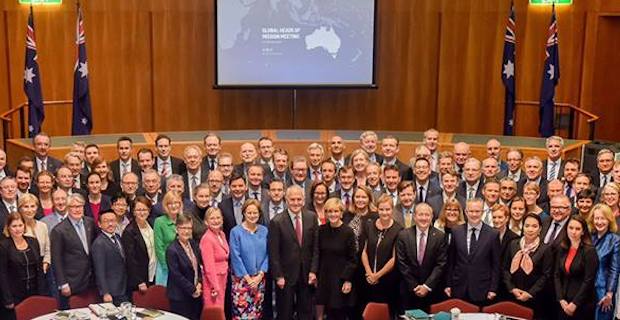Planning a More Ambitious Foreign Policy for Canberra

Australia’s head diplomats came from around the world to meet in Canberra as a group for the first time last week. It was an opportunity to help determine Australia’s foreign policy choices in an increasingly uncertain diplomatic environment. What was the outcome?
The Secretary of the Department of Foreign Affairs and Trade, Frances Adamson initiated the first Global Heads of Mission meeting (GHOMM) in Australia on 28-30 March to discuss foreign, trade and development policy objectives essential to Australia’s future. The two-day Canberra meeting was held in Parliament House, with 113 heads of mission (HOMs) participating: ambassadors, high commissioners and consul-generals from around the world.
Minister for Foreign Affairs Julie Bishop launched the meeting, with a focus on the priorities and challenges for DFAT’s. forthcoming foreign policy white paper.
The Canberra location enabled the engagement of the prime minister, the minister and assistant minister for trade, tourism and investment and the minister for international development and the Pacific. Shadow Minister for Foreign Affairs Penny Wong also participated as did the Chief Executive of Austrade, Stephanie Fahey. Partners across government and the private sector were also engaged. The Governor-General Peter Cosgrove spoke at the official GHOMM reception, drawing on the MH17 crisis as an example of diplomacy’s challenges.
The GHOMM program was interactive and dynamic. DFAT staff engaged in specific activities such as the Women in Leadership presentation by five women officers. They were also invited to observe the formal meeting at Parliament House. Leadership was a theme of the welcome dinner, with a moderated discussion on leadership in times of change and the policy, corporate and consular challenges.
Discussion on the foreign policy white paper was the priority agenda item, with three of six panel discussions testing key white paper assumptions and conclusions relating to strategic challenges; global development; and trade, investment and economic diplomacy. The fourth panel discussion covered DFAT’s corporate and culture modernisation agenda across the global network. The panel issues included digital diplomacy and Elizabeth Broderick’s Women in Leadership presentation. The fifth panel discussion, ‘Domestic Diplomacy—Engaging Australia’ was preparation for the subsequent HOM visits to states and territories. And the sixth panel discussed the implications of Trump and Brexit for Australia.
Domestic diplomacy
Following the panel discussion on the central responsibility of HOMs to be ‘out and about’, HOMs travelled to state and territory capitals and regional and rural Australia. They met business and community groups to engage on mutual interests in the context of significant global change, including how diplomacy delivers benefits to all Australians and how we can better serve community interests. A specific objective was to explain the value of Australia’s Development Assistance Program to its national interests: trade and investment, innovation, security and global development.
Bold and vital
In her opening address to the GHOMM, Julie Bishop set a uniquely challenging framework, emphasising that the “global, economic, political and strategic environment is less predictable, more unstable, than we have seen in many years”. She highlighted “significant economic volatility, rising nationalism and protectionism driven by populist campaigns, terrorism, violent extremism and radicalisation”, noting that extensive white paper consultations confirmed that “we must work differently, we must be bolder and we must be adaptable while true to our values”. The minister emphasised that in “these uncertain times, diplomacy has never been more important or more vital to our national interests”, and that “economic diplomacy is at the core of our international engagement”.
Bilateral opportunities
Specific bilateral diplomacy was briefly touched upon by the minister, most significantly Australia’s relationship with the US. While it is “fundamental to our economic and strategic security”, Julie Bishop emphasised that in the context of the US relationship “we always pursue a foreign policy that is in our own national interests” and it is ” nimble and creative diplomacy as we work with partners who will inevitably have competing interests from time to time”. This “nimble” approach to the US relationship likely reflects concern about President Trump’s assertive economic protectionism.
The Minister addressed the other bilateral relationships in the context of Australia’s interests in developing “deep links into Asia”. She said the quality of Australian links to Japan, China and India and Indonesia and the ASEANS, “will do much to shape our future”.
The China-Trump relationship and implications for Australia and the region also attracted considerable GHOMM attention.
Regional power, global interests
In this context, Julie Bishop highlighted Australia’s bid for United Nations Human Rights Council membership as bringing a Pacific voice to support UN collective efforts to safeguard peace and security.
In her speech to the HOMs, Penny Wong conveyed similar views about the international operating environment for Australian diplomacy, which she described as “a period characterised by widespread disruption”.
Senator Wong highlighted the new dynamic of less convergent economic and strategic power, with the resulting shocks of Brexit and Trump’s election, China’s South China Sea approach and North Korea’s “political weakness-driven nuclear weapons strategy”. And all exacerbated by “fundamental political, social and ethnic fault lines stretching from North Africa to Afghanistan”.
The most effective response, she argued, is to have an Asia policy that is not transactional but that is in tune with the confident and optimistic approach of the Australia in the Asian Century White Paper.
And given that the relationship with the US is of “paramount importance”, Australia needs a US alliance that is both sensitive to changes underway in the Asia-Pacific region and that is conducive to creating a more “confident, vibrant and robust regional security dialogue”.
Senator Wong also emphasised the need to revisit, reinstate and refund development assistance programs that deliver real benefits to our Pacific region. She concluded that the GHOMM’s overall focus would be on what a confident and forward-looking Australia could do in the Asia-Pacific region.
Meanwhile, Minister for Foreign Affairs, Julie Bishop finished by stating, “It is time to raise the level of our foreign policy ambition”.
Ruth Pearce served in a range of senior roles with the Department of Foreign Affairs and Trade in Canberra and was head of mission in Poland, the Phillipines, the Russian Federation and the Solomon Islands.
This article is published under a Creative Commons Licence and may be republished with attribution.





